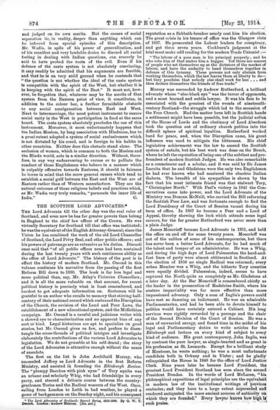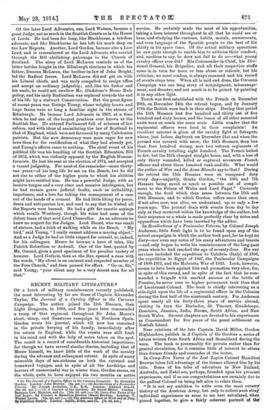THE SCOTTISH LORD ADVOCATES.*
Tna Lord Advocate till the other day was the real ruler of Scotland, and even now be has far greater powein than belong in England to the chief law officer of the Crown. He was virtually Secretary for Scotland till that office was instituted; be was the equivalent of the English Attorney-General; since the Union he has combined the work of the old Lord Chaneellor of Scotland, the Lord Privy Seal, and other public officers ; and his powers of patronage are as extensive as his duties. Disraeli Once said that "Of all public offices none had been sustained during the last twenty years with such contintions ability as the office of Lord Advocate." The history of the post it in effect the history of modern Scotland. Mr. Omond in this volume continues his narrative from the passing of the first Reform Bill down to 1880. The book is far less legal and More political than, say, Mr. Atlay's Victorian Chancellors ; and it is all the more valuable on that account, for recent political history is precisely what is least remembered, and hardest to get adequate information on Scotsmen will be grateful to an author who recalla to memory that stirring half- century of .their national record which embraced the Disruption of the Church, the revision of the Land and Poor Laws, the establishment of a new educational system, and the Midlothian campaign. Mr. Omond is a careful and judicious writer with a shrewd eye to characterization and no apparent bias of any sort or kind. Legal historians are apt to specialize on good stories, but Mr. Omond gives us few, and prefers to disen- tangle the cross-threads of political intrigue and investigate elaborately the contributions of the various Lord Advocates to legislation. We do not grumble at his self-denial ; the story of the Lord Advocates is attractive enough without the sauce of anecdote.
The first on the list is John Archibald Murray, who Succeeded Jeffrey as Lord Advocate in the first Reform Ministry, and assisted in founding the Edinburgh Review. The "plump), Bacchus with pink eyne" of Tory squibs was an urbane and scholarly Whig, who had friendships in every party, and steered a delicate cos se between the country- gentlemen Tories and the Radical *camera of the West. Once, sailingfrom London to Leith in bad weather, he played a game of bacirginimon on the Sunday night, and his consequent • The Lord Advocates of Swilooll, Second &trio, 18341680. By 0. W. T. Omen& Loafta: Andrew Melrose. gbh get]
tepetation as a Sabbath-breaker nearly cost him his electieii. The great crisis in his tenure of office was the Glasgow rkitA of 1837. He prosecuted the Labour leaders for conspiracy, and got them seven years. Cockburtee_ judgment at the trial must make odd reading for the modern Trade Unionist
"The tabu* of a poor man is his principal property ; and he who robs him of that makes him a beggar. Yet there are massed of people who set themselves up as the dictators of the market of labour, and have the audacity to band themselves together in defence of this tyranny. These persons not only abstain from working th'eaiselves, which the law leaved them at liberty to do— but they proclaim that nobody else shall work fat less . and then declare themselves the friends of free trade."
Murray was succeeded by Andrew Rotherfurd, a brilliant advocate whose "sloe-black eye " was the terror of oppenettte, and a most learned and subtle lawyer. Itwaii his fate to be associated with the greatest of the events of nineteenth- Century Scotland—the struggle which led to the secession of the Free Church. Had the matter been left in Scottish hen& a settlement Might have been possible, but the judicial ashen Of the House of Lords and the obstinacy of Lord Aberdeen took the question out of ordinary Church politics into the difficult sphere of spiritual loyalties. Rutherford worked hard for peace, and, when the Disruption came, his great influence was used to mitigate the bitterness. Hie chief legislative achievement was the law to amend the Scottish system of entails, but his beat work was done on the Bella, where he left the reputation of being one of the subtlest and pro- founded of modern Scottish Judges. He was also remarkable as a connoisseur and a scholar, and it was said by Sir Janice Lacaita that he and Glidetone were the only two Englishineti he had ever known who had mastered the obsolete Italian dialects. The breadth of his sympathies is shown by the fact that his most intimate friend was that stalwart Tory, " Christopher North." With Peel's victory in 1841 the Con- servatives came into power, and the Lord Advocate of the Ministry was Duncan McNeill, who carried the Bill reforming the Scottish Poor Law, and was fortunate enough to find the Lord Presidency of the Court of Session vacant during his term of office. In 1867 be became a Peer and a Lord of Appeal, thereby showing the luck which attends some legal careers, for the far greater Rutherford was never more than a plain Judge.
James Moncrieff became Lord Advocate in 1851, and held the office on and off for some twenty years. Moncrieff was not of the calibre of some of his contemporaries, but there has never been a better Lord Advocate, for be had much of the talent and temper of an administrator. He Was a Whig, and during the high days of Lord Palmerston the hard-and- fast lines of party were almost obliterated in Scotland. At the election of 1856 no single Radical was returned; every urban Member was a Whig, and the hitherto Tory counties were equally divided. Palmerston, indeed, seems to have captured the North quite as completely as Mr. Gladstone at a later day. At the Bar Moncrieff ia remembered chiefly as the leader in the prosecution of Madeleine Smith, where his austere impartiality was far more effective than more impassioned advocacy. Only a man of Inglis's powers could have met so damning an indictment. He was an admirable Parliamentarian, and had he been able to devote himself to politics would have certainly entered a Cabinet. His long services were rightly rewarded by a peerage and the chadi of the Second Division of the Court of Session. He was a man of unwearied energy, and found time in the midst of his legal and Parliamentary duties to write articles for the Edinburgh and lecture on every kind of Subject to every kind of audience. His great contemporary, John Inglis, was by contrast the pure lawyer, as single-hearted and as great in his profession as St. Leonards. Except for a brilliant study of Montrose, he wrote nothing; be was a most unfortunate candidate both in Orkney and in Ulster ; and he gladly relinquished the House in 1848 for the office of Lord Justice Clerk. Nine years later be became Lord President, the greatest Lord President Scotland has seen since the second President Dundee. In the words of Lord McLaren, his philosophical expositions of legal principles are the equivalent in modern law Of the institutional writings of -previous centuries; and they hive to a large extent -superseded and rendered antiquated the more ancient sources of authority on, which they are foOnded." .Every lawyer- -knois how high he
such inaber,
Of the later Lord Advocates, one, Lord Watson, became a great Judge, not So mach in the Scottish Courts as in the House of Lords. He had been for long, like Blackburne, a briefiess advocate, and like Blackburn-lie has left his mark deep on the Law Reports. Another, Lord Gordon, became also a Law Lord; and is remembered as the Lord Advocate who carried through the Bill abolishing patronage in the Church of Scotland. The story of Lord MaLliren reminds us of the bitter battles fought in the Edinburgh elections in which his father, Duncan McLaren, the brother-in-law of John Bright, led the Radical forces. Lord McLaren did not get on with his Liberal chiefs, and was early compelled to resign office and accept an ordinary judgeship; and, like his father and Ms uncle, he could not swallow Mr. Gladstone's Home Rule policy, and his early Radicalism was replaced towards the end of his life by a stalwart Conservatism. But the great figure of recent years was-G65Fge Yohaig, whose weightybrows and huge frame were to long a familiar sight in the streets of Edinburgh. He became Lord Advqcate in 1869, at a time when he had one of the largest practices ever known at the Scottish Bar. He entered Parliament full of schemes of law reform, and with ideas of assimilating the law of Scotland to that of England, which were not favoured by many Caledonian patriots. But the new democracy were more eager for new laws than for the rectification of what they had already got, and Young's efforts came to nothing. The chief event of his political life was his handling of the Scottish Education Bill of 1872, which was violently opposed by the English Noncon- formists. He lost his seat at the election of 1874, and accepted a vacant judgeship. For most of the remainder—some thirty- one years—of his long life he sat on the Bench, but he did not rise to either of the higher posts to which his abilities might have entitled him. He was a powerful Judge, with an incisive tongue and a very clear and massive intelligence, but he had certain grave judicial faults, such as irritability, impatience, and a love for taking the management of a case out of the hands of a counsel. He had little liking for prece- dents and antiquarian law, and used to say that he wished all the Reports were burned. He had a gift for caustic sayings which recalls Westbury, though his voice had none of the dulcet tones of that acid Lord Chancellor. As an advocate he knew no respect for the Judges. Lord Shand, who was small of stature, had a trick of walking while on the Bench. "My lord," said Young, "I really cannot address a moving object." And as a Judge he had as little respect for counsel, or, indeed, for his colleagues. Hence be became a hero of tales, like Patrick Robertson or Ardwall. One of the best, quoted by Mr. Omond, gives a good specimen of his peculiar variety of humour. Lord Guthrie, then at the Bar, opened a case with the words, "My client is an eminent and respected member of the Free Church," and then paused for effect. " Go on, Sir," said Young; "your client may be a very decent man for all that."















































 Previous page
Previous page